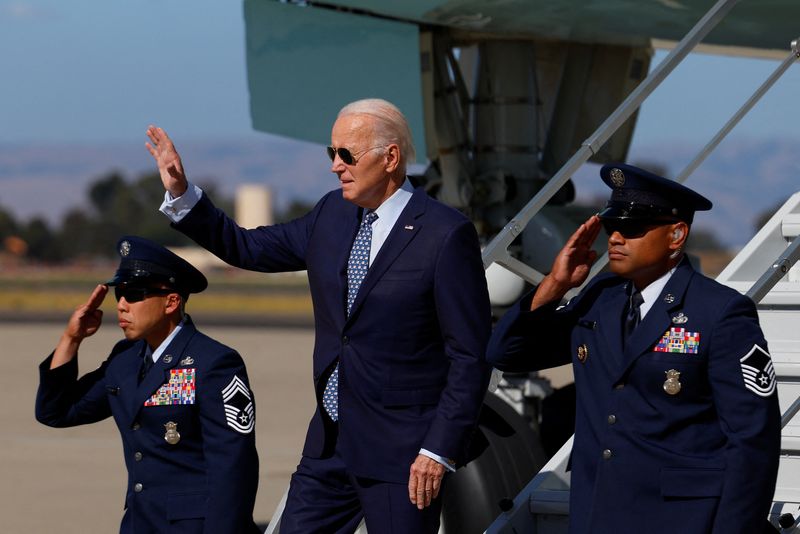WASHINGTON (Reuters) – The 2024 presidential election promises to be like no other modern American election.
Leading the field of Republican presidential candidates is former President Donald Trump, who faces a series of federal and state criminal charges related to his efforts to overturn his 2020 election loss to Democrat Joe Biden.
If Trump clinches the Republican nomination and wins the general election, he will become the first president in 130 years to win the White House after a four-year term, following Grover Cleveland.
Biden, the incumbent president, is the presumptive Democratic nominee. He will be 81 when the election is held in November 2024, making him the oldest American to win a presidential election if he secures a second term.
WHO ARE THE REPUBLICAN CANDIDATES RUNNING FOR PRESIDENT?
Trump, 77, dominates a large field of candidates who have largely avoided criticizing him for his actions related to the 2020 election for fear of alienating his base of diehard supporters. Many of these supporters believe Trump’s false claims that the election was stolen from him.
His Republican rivals, such as Florida Gov. Ron DeSantis and former U.S. Ambassador to the United Nations Nikki Haley, have instead argued that Trump’s legal troubles will hinder him in an election battle against Biden.
Two notable exceptions are Trump’s former Vice President Mike Pence and former New Jersey Governor Chris Christie, both of whom have condemned Trump’s efforts to undermine the 2020 election results.
Entrepreneur Vivek Ramaswamy, a newcomer to politics, emerges as heir to Trump’s populist America First agenda, one that is wary of an expanded federal government, corporate power and international alliances.
DeSantis was once seen as the most likely candidate to deny Trump the nomination, but his campaign has sputtered since launching in May despite having a large war chest. He runs the risk of ending up behind Trump in the rest of the pack.
Polls show Trump largely tied with Biden in head-to-head matchups, with voters concerned about Biden’s age and his handling of the economy despite job growth, infrastructure investment and a slow decline in inflation from last year’s peak.
Trump is charged in four cases in federal and state courts over his efforts to undermine the 2020 election, his mishandling of classified documents and his involvement in a “hush money” scheme involving a porn star. He has maintained his innocence and argued that he is the victim of politically motivated prosecutions, a claim the Biden administration denies. The legal calendars for these cases are an obstacle to Trump’s ability to campaign.
WHO ARE THE Democrats running for US President in 2024?
While voters may not be enthusiastic, Democratic leaders are supporting Biden and his vice president, Kamala Harris.
Robert F. Kennedy Jr., scion of the legendary political family that has promoted anti-vaccination and anti-COVID-19 safety views, is a long-term challenger, although some media reports say he plans to drop his challenge fall and launch a vaccine. an independent bid. Self-help author and speaker Marianne Williamson is another dark horse candidate.
Biden’s pitch for a second four-year term rests on his stewardship of the economy as it emerged from the COVID pandemic, and what he calls the “battle for the soul of America,” a battle against Trump-aligned Republicans.
Under Biden, unemployment fell to its lowest level in generations, gross domestic product (GDP) grew faster than expected and wages have risen. However, inflation peaked last year, and although it has declined in recent months, voters remain concerned about the high price of basic products such as food, fuel, cars and housing.
Should Trump be the Republican nominee, much of Biden’s campaign will likely focus on warning voters that Trump poses a deadly threat to American democracy.
The lack of enthusiasm among voters for a rematch between Biden and Trump suggests that a third-party challenger could gain some support or push more Americans to sit out the election. However, a major third-party candidate has yet to emerge.
When do the 2024 primaries start?
Republicans will hold their first nominating contest in January during the Iowa caucuses. Soon after, New Hampshire will hold a more traditional presidential primary, followed by Nevada, South Carolina and Michigan.
Democrats plan to hold their first primaries in South Carolina in February, with Biden not expected to face a serious challenger. “Super Tuesday” – when more than a dozen states will award party convention delegates, including California and Texas – will take place on March 5.
Each party will nominate the candidate who receives the most delegates at their nominating conventions in the summer of 2024. The Republicans will hold their convention in Milwaukee, Wisconsin, while the Democrats will hold their convention in Chicago.
The general election will be held on November 5, 2024.
WHAT ARE THE MAIN ISSUES?
Abortion: Democrats plan to make abortion a central focus of their 2024 campaign, with polls showing most Americans do not support strict limits on reproductive rights. The issue has become more motivating for those who support abortion rights than for those who oppose it, and the party hopes that threats to those rights will encourage millions of women and independents to vote their way next year.
The issue has divided Republicans. Some leaders worry that the party has gone too far with state-level restrictions since the U.S. Supreme Court last year overturned the landmark 1973 Roe v. Wade ruling, which ended constitutional protections for abortion.
Republican presidential candidates are divided between those who say abortion laws should be left to the states and those who support a national ban.
The economy: The Biden White House is trying to reassure Americans that the economy is in solid shape, with inflation slowing and unemployment at its lowest level in half a century.
Republicans say they will cut federal spending, which they blame for fueling inflation and causing spikes in consumer prices, rolling back federal regulations and cutting taxes.
Democrats argue that the economy is healthy, wages have risen and infrastructure investments will yield long-term job gains.
Voters are still not convinced. A Reuters/Ipsos poll in September found that 27% of Biden voters in 2020 said their finances were “weaker” than before the pandemic, compared to 28% who said they were “better” and 42% who said that they are “about the same.”
Immigration: Since taking office in 2021, Biden has had to contend with record numbers of migrants caught illegally crossing the U.S.-Mexico border, straining resources there and in the cities they went to, such as New York and Chicago. come under pressure. Republican candidates, including Trump, have blamed Biden for reversing more restrictive Trump-era policies and have pledged to boost border security.
Some Democrats have criticized Biden for turning to Trump-style enforcement measures to reduce illegal border crossings, while the White House insists it is moving toward a more humane and orderly system by offering migrants new ways to enter legally.
Crime: Violent crime across the country remains at higher levels than in 2019, the year before the COVID pandemic and unrest over racial justice. Americans of both parties are concerned: 88% of respondents in a September Reuters/Ipsos poll said crime would be an important issue in determining who gets their vote.
Foreign Policy: China has emerged as the foreign policy issue in the campaign, with Republicans arguing that Asian power poses a growing threat to national security, U.S. business interests and Taiwan’s independence.
The Biden administration has said it wants to “decouple,” not “decouple” its relationship with China and prevent competition between the world’s No. 1 and No. 2 from escalating into a conflict.
Ukraine is another major problem and has divided the Republican field. Trump and DeSantis argue that Biden’s support for Ukraine in its war with Russia is distracting the US from preparing for a possible confrontation with China. Other Republican candidates, such as Pence and Haley, say the United States should continue to support Ukraine.
Biden, who has focused on rebuilding ties with allies after Trump’s presidency, helped build an international coalition to help Ukraine fight Russia, and is likely to emphasize the importance of maintaining that policy during the campaign.
WHAT ARE THE KEY STATES IN THE 2024 GENERAL ELECTIONS?
That both parties hold their conventions in the Midwest says a lot about the value they place on Michigan, Pennsylvania and Wisconsin, all of which went for Trump in 2016 and Biden in 2020.

Arizona, Georgia and Nevada also appear to be closely divided and harbor growing populations that could shape the next election. Another key battleground next year could be North Carolina, another Southern state with an increasingly diverse electorate.
(This story has been refiled to remove the redundant ‘2024’ from the headline)


